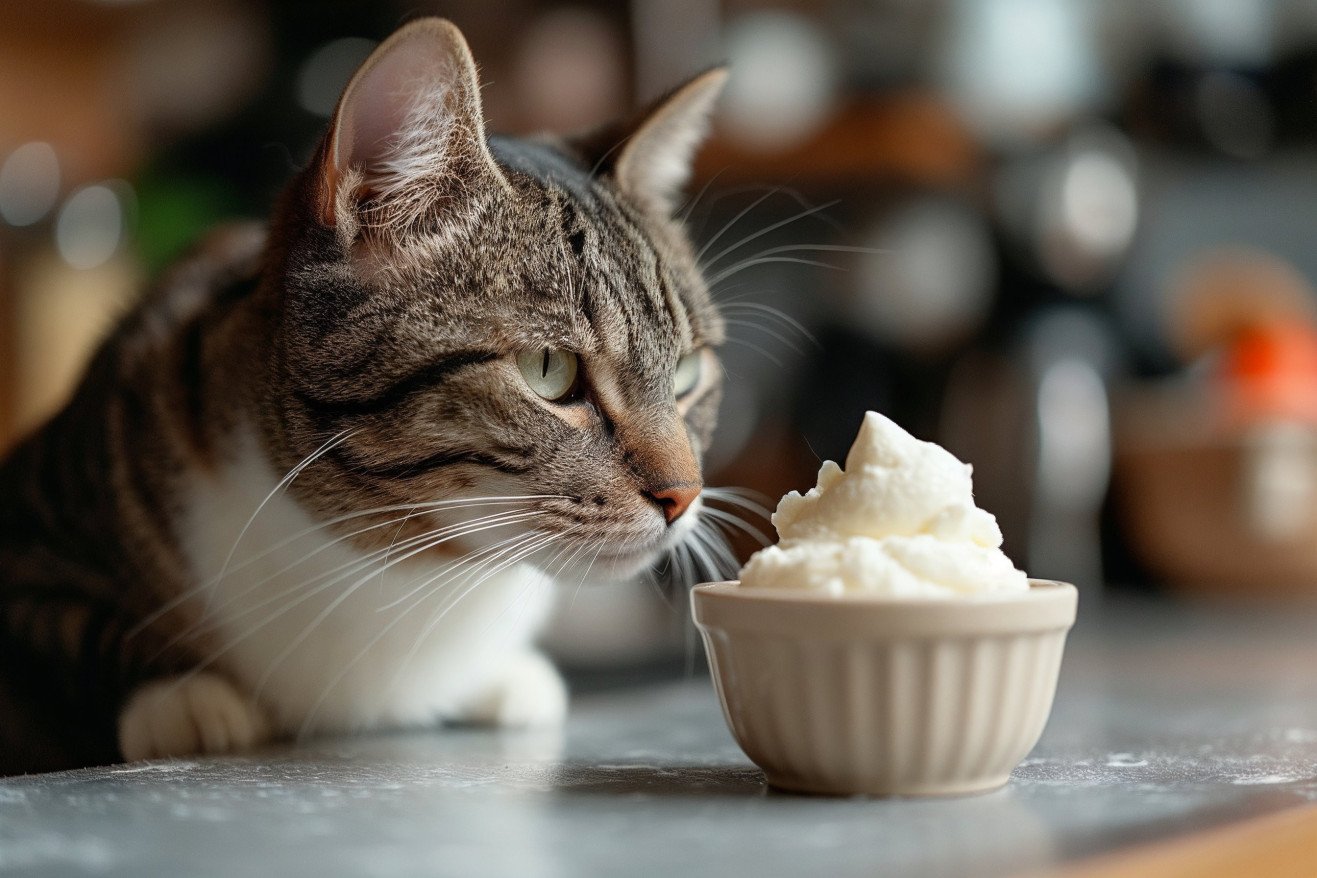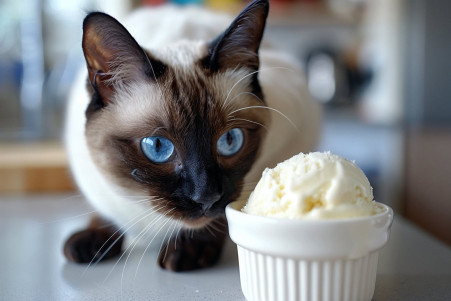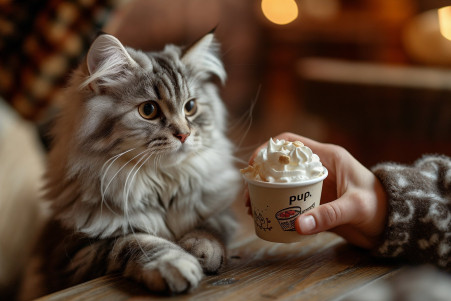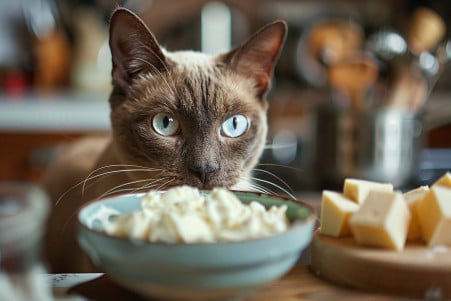Can Cats Have Whipped Cream? Exploring Lactose Intolerance in Cats
7 February 2024 • Updated 7 February 2024

That little dollop of whipped cream can be hard to resist, but is it safe for your cat? While a small amount of whipped cream won’t cause any immediate harm to your cat, it’s best to avoid giving it to them.
That’s because most cats are lactose intolerant, and eating dairy products can cause a range of digestive problems, including vomiting and diarrhea. Instead, stick to treats that are lactose-free and formulated to support your cat’s nutritional needs.
This article will explore the ins and outs of cat nutrition and the impact of dairy on cats. By looking at studies by veterinarians and animal nutritionists, we’ll provide a complete picture of how whipped cream impacts cats. This will help you understand why some human foods, while not toxic, aren’t the best choice for your pet, so you can make the best decisions about what you let your cat eat.
Can cats have whipped cream?
Lactose Intolerance in Cats
Lactose intolerance is a digestive disorder that occurs when cats don’t produce lactase, the enzyme that breaks down lactose, the sugar found in milk. According to VCA Animal Hospitals, lactose intolerance is very common in cats and can cause symptoms such as diarrhea, vomiting, bloating, and abdominal pain. In fact, cats can have these symptoms from the very first time they consume a product that contains lactose.
Because lactose intolerance is so common, dairy products, including whipped cream, are not recommended for many cats. According to Petplan, most adult cats have low levels of lactase, which means that when they consume milk or other dairy products, they can experience gastrointestinal upset. This can lead to discomfort and symptoms such as diarrhea and gas.
Zoetis Petcare notes that cats are attracted to the fats and proteins in dairy, but the undigested lactose that ferments in the intestines can cause problems. Cats that are lactose intolerant or have sensitive stomachs may be able to tolerate lactose-free ‘cat milk’ or treats made specifically for cats.
In any case, cat owners with cats that have dietary restrictions should work with a veterinarian to make sure that they’re feeding their cats in a way that meets their nutritional needs while keeping them safe.
Fats in Feline Nutrition
Cats need a diet that meets their nutritional needs, and fats are an important part of feline nutrition. As obligate carnivores, cats have adapted to metabolize animal fats efficiently, and they need these fats for energy, vitamin absorption, and cell structure.
However, not all fats are created equal in the feline metabolism. According to the Cornell University College of Veterinary Medicine, cats require a diet that is moderately high in fat, and the majority of this fat should come from animal sources.
High-fat dairy products, like whipped cream, don’t meet the nutritional needs of cats. While cats may like the taste, these products can lead to health problems, including obesity. A study published by PMC found that cats eat a diet that is low in carbohydrates and high in protein and fat from animal tissues, which is very different from the nutritional profile of whipped cream.
Fats that are good for cats include omega-3 and omega-6 fatty acids, which help with skin and coat health and inflammation. Cats should be fed specially formulated pet foods that meet the nutritional guidelines set by groups like the Feline Nutrition Expert Subcommittee of the Association of American Feed Control Officials to ensure they get the right amount of dietary fats.
Not human foods that are high in fat and sugar. By making sure cats get a balanced diet that meets their metabolic needs, pet parents can help ensure their cats stay healthy and happy.
The Bottom Line: Can Cats Have Whipped Cream?
While a small serving of whipped cream may seem like an innocent indulgence for your cat, it’s important to note the sugar content and potential impact on your cat’s health. Cats can’t taste sweet flavors, which means that sugar isn’t a necessary part of their diet.
According to Bond Vet, sugar isn’t toxic to cats, but it’s not a natural part of their obligate carnivore diet, and it can lead to gastrointestinal upset and, over time, obesity and diabetes.
Catster agrees, noting that feeding your cat sugary treats like whipped cream can lead to heart disease and make conditions like diabetes worse.
Meanwhile, a study published in PMC found that obesity is a major risk factor for diabetes in cats, which shows the importance of a well-rounded diet in preventing these health issues.
Healthier treat options, such as small pieces of meat or store-bought cat treats, are more in line with a cat’s natural dietary requirements and make better alternatives to human foods that are high in sugar. A diet that’s well-rounded, low in sugar, and high in animal-based protein can help your cat stay healthy, active, and free from the risk of obesity and diabetes.
Creating a Diet That Works for Your Cat: More Than Just Whipped Cream
Cats are obligate carnivores, which means that they need a well-balanced diet to be healthy. Cats need a diet that is high in animal-based proteins and includes nutrients that are only found in animal tissue, including essential fatty acids, minerals, and vitamins like calcium, vitamin A, and niacin, according to VCA Animal Hospitals. These nutrients are essential for everything from muscle maintenance to metabolic functions.
Whipped cream does not meet these dietary needs, as it is high in sugar and fat and does not contain the nutrients that cats need. Instead, experts recommend high-quality commercial cat foods that are designed to provide these essential nutrients. These nutrients include taurine, an amino acid that is essential for heart health and vision, and arginine, according to Countryside Veterinary Clinic.
When it comes to treats, choose commercially available treats that meet feline nutritional requirements, are high in protein, and are low in unnecessary carbohydrates and sugars. Not following these dietary guidelines can lead to health problems for your cat, which is why it’s important to make responsible feeding decisions that will help ensure your cat stays as healthy as possible.
Following this nutritional plan will help ensure that your cat’s diet is as close to its natural diet as possible and will help reduce the risk of diet-related diseases.
Final Thoughts: Whipped Cream and Your Cat’s Health
We’ve gone through the dairy details and found that while whipped cream isn’t poisonous, it’s definitely not the best choice for your cat. Whipped cream is bad for cats because they’re lactose intolerant and can’t taste sweetness. Plus, the high fat and sugar content in whipped cream doesn’t match up with the nutritional profile of a healthy cat diet, which should be high in animal-based proteins and low in carbohydrates.
We’ve also gone over the potential tummy troubles and health problems that can come from giving cats whipped cream. Good pet parents follow dietary recommendations that support their cat’s health and avoid human foods that can lead to health issues down the line.
Since every cat is different, it’s important to get personalized dietary recommendations from your vet. Taking good care of your cat’s nutritional needs will help ensure they live a long and happy life. And by making healthy choices about what they eat, we can help support our cats’ health and the special relationship we have with them.


